- Home
- Toni Morrison
Beloved
Beloved Read online
Contents
Cover Page
Title Page
Dedication
Epigraph
Foreword
Chapter I
Chapter II
Chapter III
About the Author
Also by Toni Morrison
Acclaim for Toni Morrison’s Beloved
Copyright
Sixty Million
and more
I will call them my people,
which were not my people;
and her beloved,
which was not beloved.
ROMANS 9:25
FOREWORD
In 1983 I lost my job—or left it. One, the other, or both. In any case, I had been part-time for a while, coming into the publishing house one day a week to do the correspondence-telephoning-meetings that were part of the job; editing manuscripts at home.
Leaving was a good idea for two reasons. One, I had written four novels and it seemed clear to everyone that writing was my central work. The question of priorities—how can you edit and write at the same time—seemed to me both queer and predictable; it sounded like “How can you both teach and create?” “How can a painter or a sculptor or an actor do her work and guide others?” But to many this edit–write combination was conflicting.
The second reason was less ambiguous. The books I had edited were not earning scads of money, even when “scads” didn’t mean what it means now. My list was to me spectacular: writers with outrageous talent (Toni Cade Bambara, June Jordan, Gayle Jones, Lucille Clifton, Henry Dumas, Leon Forrest); scholars with original ideas and hands-on research (William Hinton’s Shen Fan, Ivan Van Sertima’s They Came Before Columbus, Karen DeCrow’s Sexist Justice, Chinweizu’s The West and the Rest of Us); public figures eager to set the record straight (Angela Davis, Muhammad Ali, Huey Newton). And when there was a book that I thought needed doing, I found an author to write it. My enthusiasm, shared by some, was muted by others, reflecting the indifferent sales figures. I may be wrong about this, but even in the late seventies, acquiring authors who were certain sellers outranked editing manuscripts or supporting emerging or aging authors through their careers. Suffice it to say, I convinced myself that it was time for me to live like a grown-up writer: off royalties and writing only. I don’t know what comic book that notion came from, but I grabbed it.
A few days after my last day at work, sitting in front of my house on the pier jutting out into the Hudson River, I began to feel an edginess instead of the calm I had expected. I ran through my index of problem areas and found nothing new or pressing. I couldn’t fathom what was so unexpectedly troubling on a day that perfect, watching a river that serene. I had no agenda and couldn’t hear the telephone if it rang. I heard my heart, though, stomping away in my chest like a colt. I went back to the house to examine this apprehension, even panic. I knew what fear felt like; this was different. Then it slapped me: I was happy, free in a way I had never been, ever. It was the oddest sensation. Not ecstasy, not satisfaction, not a surfeit of pleasure or accomplishment. It was a purer delight, a rogue anticipation with certainty. Enter Beloved.
I think now it was the shock of liberation that drew my thoughts to what “free” could possibly mean to women. In the eighties, the debate was still roiling: equal pay, equal treatment, access to professions, schools…and choice without stigma. To marry or not. To have children or not. Inevitably these thoughts led me to the different history of black women in this country—a history in which marriage was discouraged, impossible, or illegal; in which birthing children was required, but “having” them, being responsible for them—being, in other words, their parent—was as out of the question as freedom. Assertions of parenthood under conditions peculiar to the logic of institutional enslavement were criminal.
The idea was riveting, but the canvas overwhelmed me. Summoning characters who could manifest the intellect and the ferocity such logic would provoke proved beyond my imagination until I remembered one of the books I had published back when I had a job. A newspaper clipping in The Black Book summarized the story of Margaret Garner, a young mother who, having escaped slavery, was arrested for killing one of her children (and trying to kill the others) rather than let them be returned to the owner’s plantation. She became a cause célèbre in the fight against the Fugitive Slave laws, which mandated the return of escapees to their owners. Her sanity and lack of repentance caught the attention of Abolitionists as well as newspapers. She was certainly single-minded and, judging by her comments, she had the intellect, the ferocity, and the willingness to risk everything for what was to her the necessity of freedom.
The historical Margaret Garner is fascinating, but, to a novelist, confining. Too little imaginative space there for my purposes. So I would invent her thoughts, plumb them for a subtext that was historically true in essence, but not strictly factual in order to relate her history to contemporary issues about freedom, responsibility, and women’s “place.” The heroine would represent the unapologetic acceptance of shame and terror; assume the consequences of choosing infanticide; claim her own freedom. The terrain, slavery, was formidable and pathless. To invite readers (and myself) into the repellant landscape (hidden, but not completely; deliberately buried, but not forgotten) was to pitch a tent in a cemetery inhabited by highly vocal ghosts.
I sat on the porch, rocking in a swing, looking at giant stones piled up to take the river’s occasional fist. Above the stones is a path through the lawn, but interrupted by an ironwood gazebo situated under a cluster of trees and in deep shade.
She walked out of the water, climbed the rocks, and leaned against the gazebo. Nice hat.
So she was there from the beginning, and except for me, everybody (the characters) knew it—a sentence that later became “The women in the house knew it.” The figure most central to the story would have to be her, the murdered, not the murderer, the one who lost everything and had no say in any of it. She could not linger outside; she would have to enter the house. A real house, not a cabin. One with an address, one where former slaves lived on their own. There would be no lobby into this house, and there would be no “introduction” into it or into the novel. I wanted the reader to be kidnapped, thrown ruthlessly into an alien environment as the first step into a shared experience with the book’s population—just as the characters were snatched from one place to another, from any place to any other, without preparation or defense.
It was important to name this house, but not the way “Sweet Home” or other plantations were named. There would be no adjectives suggesting coziness or grandeur or the laying claim to an instant, aristocratic past. Only numbers here to identify the house while simultaneously separating it from a street or city—marking its difference from the houses of other blacks in the neighborhood; allowing it a hint of the superiority, the pride, former slaves would take in having an address of their own. Yet a house that has, literally, a personality—which we call “haunted” when that personality is blatant.
In trying to make the slave experience intimate, I hoped the sense of things being both under control and out of control would be persuasive throughout; that the order and quietude of everyday life would be violently disrupted by the chaos of the needy dead; that the herculean effort to forget would be threatened by memory desperate to stay alive. To render enslavement as a personal experience, language must get out of the way.
I husband that moment on the pier, the deceptive river, the instant awareness of possibility, the loud heart kicking, the solitude, the danger. And the girl with the nice hat. Then the focus.
124 WAS SPITEFUL. Full of a baby’s venom. The women in the house knew it and so did the children. For years each put up with the spite in his own way, but by 1873 Sethe and her daughter Denver were its only vi
ctims. The grandmother, Baby Suggs, was dead, and the sons, Howard and Buglar, had run away by the time they were thirteen years old—as soon as merely looking in a mirror shattered it (that was the signal for Buglar); as soon as two tiny hand prints appeared in the cake (that was it for Howard). Neither boy waited to see more; another kettleful of chickpeas smoking in a heap on the floor; soda crackers crumbled and strewn in a line next to the door-sill. Nor did they wait for one of the relief periods: the weeks, months even, when nothing was disturbed. No. Each one fled at once—the moment the house committed what was for him the one insult not to be borne or witnessed a second time. Within two months, in the dead of winter, leaving their grandmother, Baby Suggs; Sethe, their mother; and their little sister, Denver, all by themselves in the gray and white house on Bluestone Road. It didn’t have a number then, because Cincinnati didn’t stretch that far. In fact, Ohio had been calling itself a state only seventy years when first one brother and then the next stuffed quilt packing into his hat, snatched up his shoes, and crept away from the lively spite the house felt for them.
Baby Suggs didn’t even raise her head. From her sickbed she heard them go but that wasn’t the reason she lay still. It was a wonder to her that her grandsons had taken so long to realize that every house wasn’t like the one on Bluestone Road. Suspended between the nastiness of life and the meanness of the dead, she couldn’t get interested in leaving life or living it, let alone the fright of two creeping-off boys. Her past had been like her present—intolerable—and since she knew death was anything but forgetfulness, she used the little energy left her for pondering color.
“Bring a little lavender in, if you got any. Pink, if you don’t.”
And Sethe would oblige her with anything from fabric to her own tongue. Winter in Ohio was especially rough if you had an appetite for color. Sky provided the only drama, and counting on a Cincinnati horizon for life’s principal joy was reckless indeed. So Sethe and the girl Denver did what they could, and what the house permitted, for her. Together they waged a perfunctory battle against the outrageous behavior of that place; against turned-over slop jars, smacks on the behind, and gusts of sour air. For they understood the source of the outrage as well as they knew the source of light.
Baby Suggs died shortly after the brothers left, with no interest whatsoever in their leave-taking or hers, and right afterward Sethe and Denver decided to end the persecution by calling forth the ghost that tried them so. Perhaps a conversation, they thought, an exchange of views or something would help. So they held hands and said, “Come on. Come on. You may as well just come on.”
The sideboard took a step forward but nothing else did.
“Grandma Baby must be stopping it,” said Denver. She was ten and still mad at Baby Suggs for dying.
Sethe opened her eyes. “I doubt that,” she said.
“Then why don’t it come?”
“You forgetting how little it is,” said her mother. “She wasn’t even two years old when she died. Too little to understand. Too little to talk much even.”
“Maybe she don’t want to understand,” said Denver.
“Maybe. But if she’d only come, I could make it clear to her.” Sethe released her daughter’s hand and together they pushed the sideboard back against the wall. Outside a driver whipped his horse into the gallop local people felt necessary when they passed 124.
“For a baby she throws a powerful spell,” said Denver.
“No more powerful than the way I loved her,” Sethe answered and there it was again. The welcoming cool of unchiseled headstones; the one she selected to lean against on tiptoe, her knees wide open as any grave. Pink as a fingernail it was, and sprinkled with glittering chips. Ten minutes, he said. You got ten minutes I’ll do it for free.
Ten minutes for seven letters. With another ten could she have gotten “Dearly” too? She had not thought to ask him and it bothered her still that it might have been possible—that for twenty minutes, a half hour, say, she could have had the whole thing, every word she heard the preacher say at the funeral (and all there was to say, surely) engraved on her baby’s headstone: Dearly Beloved. But what she got, settled for, was the one word that mattered. She thought it would be enough, rutting among the headstones with the engraver, his young son looking on, the anger in his face so old; the appetite in it quite new. That should certainly be enough. Enough to answer one more preacher, one more abolitionist and a town full of disgust.
Counting on the stillness of her own soul, she had forgotten the other one: the soul of her baby girl. Who would have thought that a little old baby could harbor so much rage? Rutting among the stones under the eyes of the engraver’s son was not enough. Not only did she have to live out her years in a house palsied by the baby’s fury at having its throat cut, but those ten minutes she spent pressed up against dawn-colored stone studded with star chips, her knees wide open as the grave, were longer than life, more alive, more pulsating than the baby blood that soaked her fingers like oil.
“We could move,” she suggested once to her mother-in-law.
“What’d be the point?” asked Baby Suggs. “Not a house in the country ain’t packed to its rafters with some dead Negro’s grief. We lucky this ghost is a baby. My husband’s spirit was to come back in here? or yours? Don’t talk to me. You lucky. You got three left. Three pulling at your skirts and just one raising hell from the other side. Be thankful, why don’t you? I had eight. Every one of them gone away from me. Four taken, four chased, and all, I expect, worrying somebody’s house into evil.” Baby Suggs rubbed her eyebrows. “My firstborn. All I can remember of her is how she loved the burned bottom of bread. Can you beat that? Eight children and that’s all I remember.”
“That’s all you let yourself remember,” Sethe had told her, but she was down to one herself—one alive, that is—the boys chased off by the dead one, and her memory of Buglar was fading fast. Howard at least had a head shape nobody could forget. As for the rest, she worked hard to remember as close to nothing as was safe. Unfortunately her brain was devious. She might be hurrying across a field, running practically, to get to the pump quickly and rinse the chamomile sap from her legs. Nothing else would be in her mind. The picture of the men coming to nurse her was as lifeless as the nerves in her back where the skin buckled like a washboard. Nor was there the faintest scent of ink or the cherry gum and oak bark from which it was made. Nothing. Just the breeze cooling her face as she rushed toward water. And then sopping the chamomile away with pump water and rags, her mind fixed on getting every last bit of sap off—on her carelessness in taking a shortcut across the field just to save a half mile, and not noticing how high the weeds had grown until the itching was all the way to her knees. Then something. The plash of water, the sight of her shoes and stockings awry on the path where she had flung them; or Here Boy lapping in the puddle near her feet, and suddenly there was Sweet Home rolling, rolling, rolling out before her eyes, and although there was not a leaf on that farm that did not make her want to scream, it rolled itself out before her in shameless beauty. It never looked as terrible as it was and it made her wonder if hell was a pretty place too. Fire and brimstone all right, but hidden in lacy groves. Boys hanging from the most beautiful sycamores in the world. It shamed her—remembering the wonderful soughing trees rather than the boys. Try as she might to make it otherwise, the sycamores beat out the children every time and she could not forgive her memory for that.
When the last of the chamomile was gone, she went around to the front of the house, collecting her shoes and stockings on the way. As if to punish her further for her terrible memory, sitting on the porch not forty feet away was Paul D, the last of the Sweet Home men. And although she could never mistake his face for another’s, she said, “Is that you?”
“What’s left.” He stood up and smiled. “How you been, girl, besides barefoot?”
When she laughed it came out loose and young. “Messed up my legs back yonder. Chamomile.”
He ma
de a face as though tasting a teaspoon of something bitter. “I don’t want to even hear ’bout it. Always did hate that stuff.”
Sethe balled up her stockings and jammed them into her pocket. “Come on in.”
“Porch is fine, Sethe. Cool out here.” He sat back down and looked at the meadow on the other side of the road, knowing the eagerness he felt would be in his eyes.
“Eighteen years,” she said softly.
“Eighteen,” he repeated. “And I swear I been walking every one of em. Mind if I join you?” He nodded toward her feet and began unlacing his shoes.
“You want to soak them? Let me get you a basin of water.” She moved closer to him to enter the house.
“No, uh uh. Can’t baby feet. A whole lot more tramping they got to do yet.”
“You can’t leave right away, Paul D. You got to stay awhile.”
“Well, long enough to see Baby Suggs, anyway. Where is she?”
“Dead.”
“Aw no. When?”
“Eight years now. Almost nine.”
“Was it hard? I hope she didn’t die hard.”
Sethe shook her head. “Soft as cream. Being alive was the hard part. Sorry you missed her though. Is that what you came by for?”
“That’s some of what I came for. The rest is you. But if all the truth be known, I go anywhere these days. Anywhere they let me sit down.”
“You looking good.”
“Devil’s confusion. He lets me look good long as I feel bad.” He looked at her and the word “bad” took on another meaning.
Sethe smiled. This is the way they were—had been. All of the Sweet Home men, before and after Halle, treated her to a mild brotherly flirtation, so subtle you had to scratch for it.
Except for a heap more hair and some waiting in his eyes, he looked the way he had in Kentucky. Peachstone skin; straight-backed. For a man with an immobile face it was amazing how ready it was to smile, or blaze or be sorry with you. As though all you had to do was get his attention and right away he produced the feeling you were feeling. With less than a blink, his face seemed to change—underneath it lay the activity.

 Paradise
Paradise Beloved
Beloved Home
Home Tar Baby
Tar Baby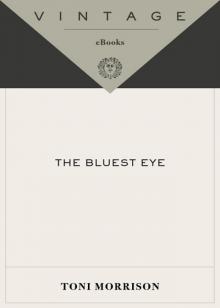 The Bluest Eye
The Bluest Eye Jazz
Jazz Love
Love Sula
Sula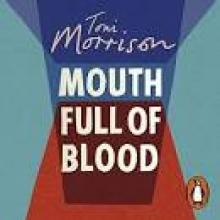 Mouth Full of Blood
Mouth Full of Blood Song of Solomon
Song of Solomon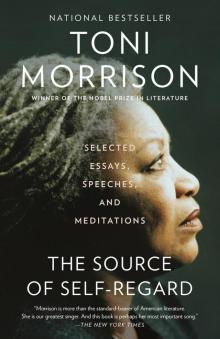 The Source of Self-Regard
The Source of Self-Regard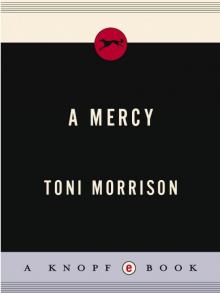 A Mercy
A Mercy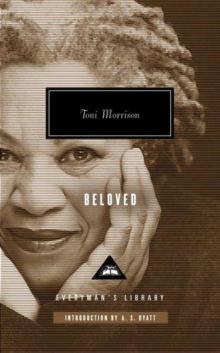 Beloved_a novel
Beloved_a novel